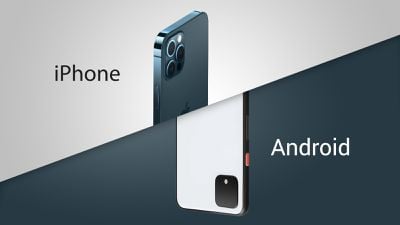Apple’s iPhones have overtaken Android devices to account for more than half of all smartphones used in the United States, according to data from Counterpoint Research (via Financial Times).
The active installed base of iPhones passed the 50% landmark in the quarter ending in June, while around 150 other mobile brands using Google’s Android operating system, led by Samsung and Lenovo, accounted for the rest.
“Operating systems are like religions — never significant changes. But over the past four years the flow has consistently been Android to iOS,” said Counterpoint’s research director, Jeff Fieldhack. “This is a big milestone that we could see replicated in other affluent countries across the globe.”
Compared to annual sales, the active installed base is an even more significant competitive marker representing Apple’s slow burn in the smartphone market, as it takes into account users brought into the Apple ecosystem through the used phone market as well as those who use iPhones that were purchased years ago.
Android phones appeared on the market in 2008, a year after the iPhone debuted, and overtook the iOS-installed base in 2010, according to NPD group. In the three years previous, phone sales were dominated by the likes of Nokia, Motorola, Windows, and Blackberry.
The iPhone has made Apple the largest company in the world, with a market capitalization of $2.5 trillion. In 2020, the installed global base for iPhones surpassed 1 billion devices. CEO Tim Cook recently said that Apple had “set a June quarter record for switchers,” or consumers leaving Android for iOS.
Apple will unveil the next-generation iPhone 14 series at its “Far Out” media event on Wednesday, September 7, where it is also expected to debut the Apple Watch Series 8. We are expecting a 6.1-inch iPhone 14, a 6.7-inch iPhone Max, a 6.1-inch iPhone 14 Pro, and a 6.7-inch iPhone 14 Pro Max. There will be no 5.4-inch iPhone “mini” this year, with Apple instead opting for larger devices.





